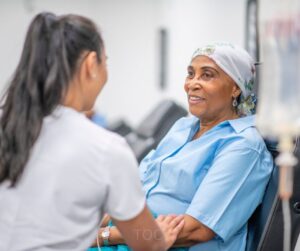Julia Lewin, PharmD, BCOP, BCPS
Clinical trials are essential for advancing cancer treatments and improving patient outcomes. There is evidence that survival rates are higher for cancer patients enrolled in a clinical trial versus those who were not.[i] While large academic medical centers often lead these trials, community cancer centers are increasingly recognized for their potential to broaden participant pools and enhance research diversity. Optimizing clinical trial enrollment at these centers requires a tailored approach that addresses their unique challenges and leverages their strengths.
Understanding the Challenges
- Resource limitations: Community cancer centers often face constraints related to funding, staff, and infrastructure. Unlike large academic institutions, they may lack dedicated research teams or specialized facilities, impacting their ability to manage complex trials.
- Patient engagement: Patients at community centers might have different concerns compared to those at academic centers, such as transportation difficulties or a lack of awareness about clinical trials.1 These factors can influence their willingness to participate.
- Trial complexity: Many clinical trials are designed with protocols that assume access to advanced facilities and extensive patient monitoring, which may not always align with the resources of community centers.[ii]
Strategies for Optimization
- Education and Training: Enhancing the knowledge and skills of staff at community centers is crucial. Involvement in events and organizations such as the Advanced Practice Providers Oncology Summit, Advanced Practitioner Society for Hematology and Oncology, and the Association of Clinical Research Professionals can provide valuable educational resources. The National Comprehensive Cancer Network and the National Cancer Institute (NCI) Cancer Trials Support Unit (CTSU) provide helpful information on identifying and participating in clinical trials. Recent guidelines from the NCI Division of Cancer Prevention (DCP) and Division of Cancer Control and Population Sciences (DCCPS) allow advanced practice providers (APPs) to serve in advanced roles in NCI Community Oncology Research Program (NCORP) protocols.[iii] The Mentoring Intervention for Advanced Practice Providers Across the National Clinical Trials Network program (NCTN MAPP) is a year-long mentorship for APPs to benefit from guidance by experienced peer-mentors in expanding and increasing involvement in clinical trials.[iv]
Regular internal training programs about clinical trial processes, regulatory requirements, and patient communication can empower staff to better manage and promote trials. Additionally, taking the time to capture and review site performance metrics, including enrollment rates, participant retention rates, and protocol deviations, can help sites optimize and identify areas of training, and help provide actionable opportunities for improvement.[v]
- Streamlining protocols: Collaborating with sponsors to simplify trial protocols can make them more manageable for community centers. A designated clinic team member or members should analyze protocol feasibility for the site, and work to ensure that protocols are feasible for their unique site. This includes reducing the number of visits, streamlining data collection and laboratory monitoring requirements, seeking out flexibility in inclusion and exclusion criteria, and making the trials more adaptable to local resources.1,[vi],[vii]
- Prescreening patients: Implementing prescreening practices is a valuable effort that community sites can undertake to more efficiently identify potential clinical trials for patients. By identifying clinical trials that patients would be eligible for when they are first seen in clinic, patients and clinicians can be more readily able to enroll in a clinical trial when the time comes. One way to accomplish this is by identifying a dedicated team member, such as a research coordinator, nurse, or APP, to help screen patients or develop tools to aid providers in screening patients more efficiently.
- Patient outreach and education: Developing tailored outreach programs to educate patients about the benefits and safety of clinical trials can increase enrollment.2 Focusing on outreach to underrepresented populations, including diverse age groups and ethnicities can increase engagement. Utilizing local media, patient advocacy groups, and community events are some strategies to raise awareness.[viii] Spending a few minutes of each visit addressing potential clinical trial options can help engage patients and increase willingness to participate in clinical trials. Providing clear information about the trial’s potential benefits can increase patient interest.
- Leveraging technology: Implementing telemedicine for consultations and follow-ups can mitigate logistical challenges related to trial participation. Electronic data capture systems and remote monitoring tools can also reduce the burden on community center staff.
- Building partnerships: Forming alliances with academic institutions can provide community centers with additional resources, expertise, and support. These partnerships can also facilitate access to a broader range of trials.
- Enhancing support systems: Establishing patient navigators or dedicated clinical trial coordinators can assist in guiding patients through the trial process, addressing their concerns, and ensuring adherence to protocols. These individuals can also provide invaluable support for the prescreening practices previously discussed.
Optimizing clinical trial enrollment at community cancer centers is a multifaceted endeavor that requires addressing resource limitations, enhancing patient engagement, and simplifying trial protocols. By focusing on education, leveraging technology, and building strong partnerships, community centers can play a pivotal role in advancing cancer research and improving patient outcomes. Collaborative efforts and innovative solutions will be key in overcoming challenges and maximizing the impact of clinical trials in diverse communities.
Julia Lewin, PharmD, BCOP, BCPS, is a clinical oncology pharmacist and investigational drug service pharmacist at Fred Hutchinson Cancer Center in Seattle, WA.
- Greenwade, M. M., Moore, K. N., Gillen, J. M., Ding, K., Rowland, M. R., Crim, A. K., Kleis, B., & Gunderson, C. C. (2017). Factors influencing clinical trial enrollment among ovarian cancer patients. Gynecologic oncology, 146(3), 465–469.
- Siembida, E. J., Loomans-Kropp, H. A., Trivedi, N., O’Mara, A., Sung, L., Tami-Maury, I., Freyer, D. R., & Roth, M. (2020). Systematic review of barriers and facilitators to clinical trial enrollment among adolescents and young adults with cancer: Identifying opportunities for intervention. Cancer, 126(5), 949–957.
- Blanke, C.D. (2024). Mentoring APPs Across the NCTN. SWOG Cancer Research Network The Front Line. https://www.swog.org/news-events/news/2024/08/23/mentoring-apps-across-nctn
- The Hope Foundation for Cancer Research (https://thehopefoundation.org/funding-opportunities/mapp-program/)
- Thoma, A., Farrokhyar, F., McKnight, L., Bhandari,M. (2010). How to optimize patient recruitment. Canadian journal of surgery, 53(3), 205-210.
- usso, C., Stout, L., House, T., & Santana, V. M. (2020). Barriers and facilitators of clinical trial enrollment in a network of community-based pediatric oncology clinics. Pediatric blood & cancer, 67(4), e28023. https://doi.org/10.1002/pbc.28023
- Spira, A. I., Stewart, M. D., Jones, S., Chang, E., Fielding, A., Richie, N., Wood, L. S., Thompson, M. A., Jones, L., Nair, A., Mahal, B. A., & Gerber, D. E. (2021). Modernizing Clinical Trial Eligibility Criteria: Recommendations of the ASCO-Friends of Cancer Research Laboratory Reference Ranges and Testing Intervals Work Group. Clinical cancer research : an official journal of the American Association for Cancer Research, 27(9), 2416–2423.
- Enhancing clinical trial awareness and outreach. (2009). Journal of oncology practice, 5(4), 205–207.

Julia Lewin, PharmD, BCOP, BCPS, is a clinical oncology pharmacist and investigational drug service pharmacist at Fred Hutchinson Cancer Center in Seattle, WA.







